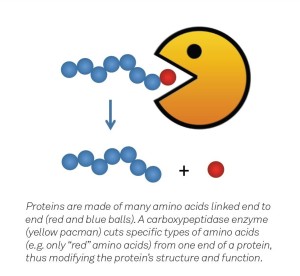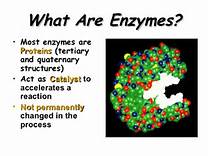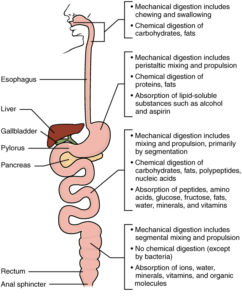Let’s not forget with enzymes they also break proteins down in our body:
The breaking down of proteins=Trypsin Proteins are large biological molecules consisting of one or more chains of amino acids. Proteins perform a vast array of functions within living organisms, including catalyzing  metabolic reactions, replicating DNA, responding to stimuli, and transporting molecules from one location to another. Trypsin is a enzyme catalyst, which allows the catalysis of chemical reactions. The ending product of the break down is amino acids not sugar. Know high on a protein diet continuously for years can hurt the body also.
metabolic reactions, replicating DNA, responding to stimuli, and transporting molecules from one location to another. Trypsin is a enzyme catalyst, which allows the catalysis of chemical reactions. The ending product of the break down is amino acids not sugar. Know high on a protein diet continuously for years can hurt the body also.
Enzymes deal with breaking down our foods because they take a major role in what we call the process digestion in the human body. but notice what the ending result is of mostly every ingredient in our 4 food groups is; SUGAR. It because of the food has some sugar in it but also the chemical reaction with the enzyme to allow the food to break down into smaller compounds to be utilized in the body with send through the entire digestion process.
There are risks with eating just high protein diets for long periods of time. You put yourself at risk for: Osteoporosis: Research shows that women who eat high protein diets based on meat have a higher rate of bone density loss than those who don’t. Women who eat meat lose an average of 35% of their bone density by age 65, while women who don’t eat meat lose an average of 18%. In the long run, bone density loss leads to osteoporosis.
Kidneys: A high protein diet puts strain on the kidneys. It is well known that patients with kidney problems suffer from eating a high protein diet which is due to the high amino acids levels. A high-protein diet may worsen kidney function in people with kidney disease because your body may have trouble eliminating all the waste products of protein metabolism.
However, the risks of using a high-protein diet with carbohydrate restriction for the long term are still being studied. Several health problems may result if a high-protein diet is followed for an extended time:
Some high-protein diets restrict carbohydrate intake so much that they can result in nutritional deficiencies or insufficient fiber, which can cause health problems such as constipation and diverticulitis.
Some high-protein diets promote foods such as red meat and full-fat dairy products, which may increase your risk of heart disease.
If you want to follow a high-protein diet, do so only as a short-term weight-loss aid. Also, choose your protein wisely. Good choices include fish, skinless chicken, lean beef, pork and low-fat dairy products. Choose carbs that are high in fiber, such as whole grains and nutrient-dense vegetables and fruit.
It’s always a good idea to talk with your doctor before starting any weight-loss diet. And that’s especially important in this case if you have kidney disease, diabetes or other chronic health condition (s).
So if you want to continue on high protein diets longer than 6 months know how to alkalize the body chemicals to decrease the proteins and there are supplements that can do that via the pharmacy or look up even online.




